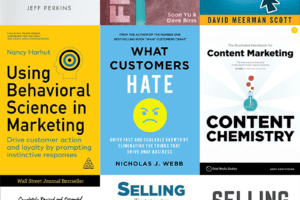???? Episode 103 of Yes, and Marketing
Work at an agency? Interested in digital advertising? Generally curious about the future of marketing? This one’s for you.
Erik Huberman is the founder and CEO of Hawke Media, the fastest growing media consultancy in the United States. Since its beginning in 2014, the company has worked with over 1500 brands, ranging from small startups to global names like Verizon Wireless and Alibaba. He’s also written The Hawke Method, a book which outlines his three tested principles for marketing success.
In this episode of Yes, and Marketing, Erik shares his thoughts on all aspects of agencies and marketing, including:
- How he differentiated Hawke Media in the saturated agency space
- Why you shouldn’t be choosing an ad platform based on demographics
- TikTok vs. Facebook
- Why more content is better
- What it takes to market to Gen Z
Listen to the full interview above for all the insights (including how much money Erik made selling Beanie Babies as an eight-year-old) or read on for our highlights from the conversation. You can also view excerpts from all our episodes on our show page.
???? Who is Erik Huberman?
Name: Erik Huberman
What he does: Founder and CEO of Hawke Media
Find Erik on the web: Hawke Media | The book | LinkedIn | Twitter
Get smart: “People are much more likely to share your content than they are your product or service page.”
???? Episode Highlights
Read verbatim excerpts from our interview with Erik Huberman.
Erik’s hot take on the marketing agency landscape
“99% of agencies are bullshit. And the 1% of agencies, the vast majority of those go up market, so they only work with the Fortune 2000, give or take. What that means is, every small and medium business—and medium is still a several hundred million dollar business—they get all these random agencies where none of them really know what they’re doing.”
Hawke Media’s mission
“Our mission is accessibility to great marketing for everyone, meaning let’s be the best at what we do in marketing, but super easy to work with: flexible, nimble, month-to-month, ala carte, cost-effective—all these things.”
The truth behind Facebook performance
“Everybody thinks Facebook is performing horribly. Facebook has performance issues—I’m not gonna negate that, there’s a reason they’re down $10 billion in revenue. But the truth is, their problem is that their tracking window on sales went from 28 days to 7 days. So, they used to track a 28-day purchase cycle; now they track seven days.
What I know with our data is, in e-commerce specifically, for a $50 purchase, your average purchase cycle is probably around three weeks. For a hundred dollars, it’s about five weeks. For $200, about six weeks, and then it trails off after that. This is the most important stat I’ve seen in marketing that people miss: the purchase cycle, from when you advertise and introduce yourself to someone, to when they buy—there’s a period in there. And if you miss that—if you think it’s seven days and it’s actually four weeks, you’re going to cut off advertising after seven days, because you think it’s not working. It’s like, you haven’t even seen the results yet.”
The 3 principles of marketing
“The three principles of marketing: awareness, nurturing, and trust.
Awareness is what you do to introduce yourself to a new customer: advertising, PR, word-of-mouth—all the things people frankly think of as marketing.
Nurturing is what you do during that purchase-cycle period from when someone is introduced to you, to when they actually buy—and then post-purchase to bring them back because you do have to drive an ongoing purchase cycle for customers.
…And then trust is synonymous with brand. 75% of consumers say they won’t buy from a company they don’t inherently trust, which goes with third-party validation, like influencer marketing PR, testimonials, referrals.”
Advertise based on context, not demographic
“What I think most marketers miss still is, they keep talking about ‘We’re reaching my demographic.’ Well, on digital, you reach them anywhere. They’re all everywhere, meaning like there’s enough baby boomers on TikTok that you’ll be fine. So it’s not like, ‘Well, it’s young people on TikTok and business people on LinkedIn and, you know, moms on Facebook.’ No, not the case. They all have all the demos you’re trying to reach.
So you’re actually not picking platforms based on demographics anymore, you’re picking them based on context. What do I need the person to be doing when they receive this advertisement that gives them a high propensity to want to buy my product or service?”
The advantage of Facebook
“The great thing about Facebook is, 99.9% of people on Facebook are just wasting time—and I include Instagram in this, to be clear. You’re scrolling through your newsfeed, doing nothing productive, and so I can target you during a time where you’re literally telling me you’re bored and doing nothing else.”
Why TikTok advertising works
“For a long time, everybody was on Facebook. You could reach whoever you want and they were on Facebook doing nothing. TikTok has a very similar usage. I actually think TikTok takes it even a step further because its algorithm is interest based, not social based, meaning I’m used to seeing random videos on TikTok, versus Facebook, where it’s supposed to be all my friends and all of a sudden I see a random ad. On TikTok, I’m seeing random stuff all the time, and then I see a random ad. And you can target me based on what I’ve shown, not what I’ve indicated are my interests by liking a page, but what I actually show are my interests by the time I spend on certain videos.”
A prediction on Facebook
“Facebook: it’s become trendy, and not trendy. So, between alienating a lot of their audience and the way that their politics were, between their bad press, between the way they treated their advertisers, and now, going to battle with Apple—and Apple is going to win that one.
…Their algorithm and their way of approaching the newsfeed, I think went south when they changed it from time-based to that algorithm. And every user that understands it, every social media company I know, says that was the dumbest change. And five years later, now they’re testing rolling it back. Five years later… Something’s bad with that culture. And I get that Facebook’s always taken an approach of like, ‘We know better than our customers what they want.’ Except for now, again, look at TikTok. That’s what people want. They want interest-based content. Their social graph is less important. And if you weave the two together, awesome, but Facebook hasn’t done a good job of that.”
Why content is so powerful
“Why content is so powerful is you get nurturing: People that are engaged with you are going to now engage with your content, and they’re gonna engage with your brand above and beyond a purchase decision, which inherently will make them purchase more. They’re going to be on your site or wherever it is—they’re going to be engaged with your brand. By nature, you’re going to get more purchases that way, so it’s gonna increase your conversion rate on customers. It’s also gonna increase your lifetime value because people that already bought will be reminded of you and be like, ‘Oh yeah, maybe I should buy.’
It’s also the best tool for word-of-mouth. People are much more likely to share your content than they are your product or service page. So creating content that they can share, so they’re introducing their friends to you—great tool. And then trust, because then they start to understand your voice, what you stand for, what you see as your priority, and that starts to reinforce your brand. So, if you do a good job of it, it can really help with building trust with your customers too. So, it covers the gamut in terms of what we call the three principles of marketing.”
Lesson 1 about marketing to Gen Z
“They’re way more individualized. Their individuality is much more important to Gen Z than I’ve seen with any other generation.”
????️ Erik Huberman Quotes
“Google is a place to answer existing demand; Facebook is a place to create new demand.”
“Marketing isn’t as volatile in terms of what you need to be doing as people think it is.”
“People are much more likely to share your content than they are your product or service page.”
“One of the biggest mistakes agencies make is they try to win the business by saying whatever the hell they need to.”
“By being an entrepreneur, you’re signing up to handle the worst problems in the business, all the time. And it never goes away.”
“Marketing is just a megaphone on a product.”
???? Learn More
Find more of Erik’s insights in his book The Hawke Method.
Erik also mentioned Gary Vaynerchuk and Nick Tran as two of his marketing peers to follow.



